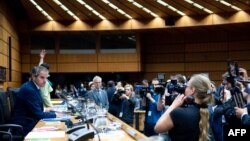The International Atomic Energy Agency, the IAEA, has adopted a resolution censuring Iran over its lack of cooperation regarding its nuclear program.
Sponsored by France, Britain and Germany, the resolution passed with 20 votes in favor, 12 abstentions, and two – Russia and China – against.
Among many issues, the resolution noted the IAEA Director General’s “great concern that undeclared nuclear material had been present at several undeclared locations in Iran and that its current location(s) are not known to the Agency.” The resolution deplored Iran’s barring of several experienced inspectors, whose input “is essential to fully allow the Agency to conduct its verification activities in Iran effectively.” The resolution underlined the importance for Iran “to resolve safeguards issues which remain outstanding.”
In her remarks to the IAEA Board of Governors U.S. Ambassador to the IAEA Laura Holgate called Iran’s nuclear program a “serious challenge to international security.”
First, she said, because Iran has failed to provide the legally required cooperation to resolve long outstanding safeguards issues involving nuclear material at undeclared locations. In consequence, the IAEA does not have the confidence needed to assess that Iran’s declarations are correct and complete.
Second, noted Ambassador Holgate, “There is a deeply troubling and steady drumbeat…from senior Iranian officials threatening that Iran may reconsider its stated nuclear doctrine and asserting that Iran has all the technical capabilities needed to quickly build nuclear weapons should it decide to do so.”
Finally, she pointed out that Iran’s past response to IAEA resolutions was escalation rather than cooperation, including by producing 60% enriched uranium at its Fordow facility. Quoting IAEA Director General Rafael Grossi, Ambassador Holgate said, “Iran is the only country that does not have a nuclear weapon that is enriching to this level.”
While the United States supports the resolution adopted on June 5, Ambassador Holgate said, “It is important that resolutions be tied to a broader strategy. This resolution should be a first step in a strategy aimed at achieving a sustainable, effective solution to Iran’s nuclear program that includes full cooperation with the IAEA.”
Ambassador Holgate called on Iran “to step back from its provocative nuclear activities and finally deliver the full cooperation required by its safeguards obligations.” She declared, “The opportunity for Iran to choose a different path from the one it has taken remains open.”
The IAEA Censures Iran

The International Atomic Energy Agency, the IAEA, has adopted a resolution censuring Iran over its lack of cooperation regarding its nuclear program.













